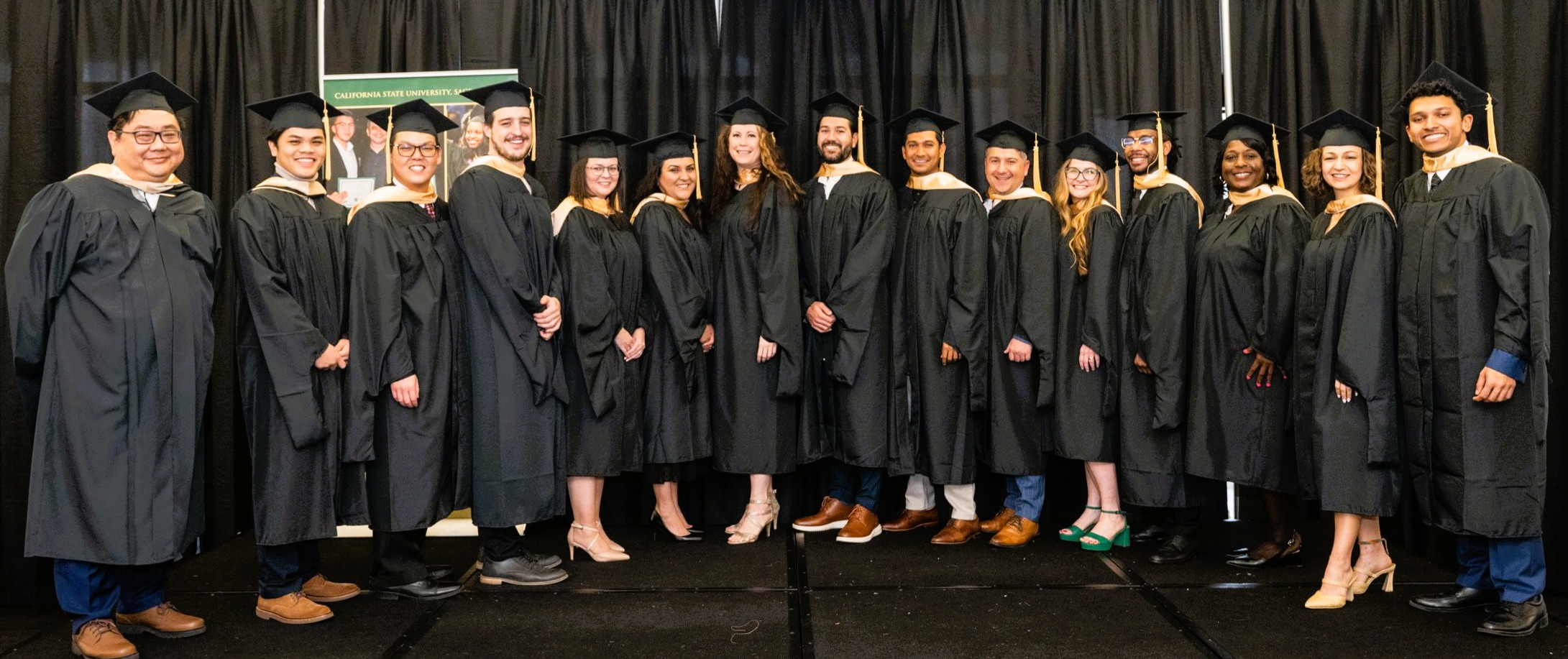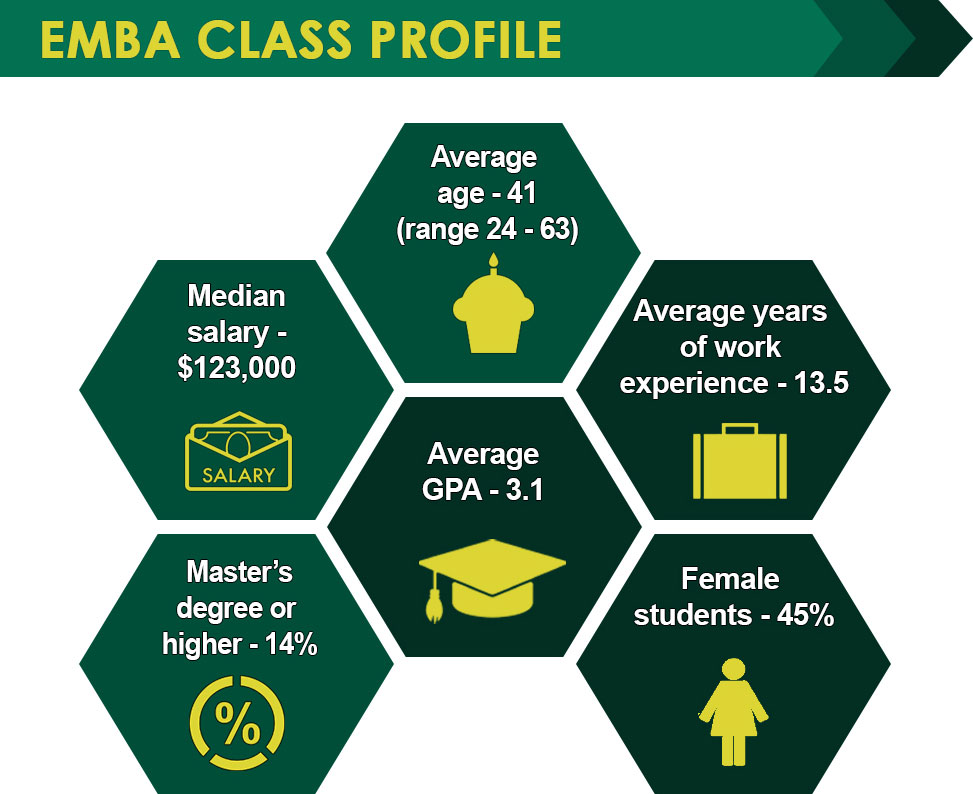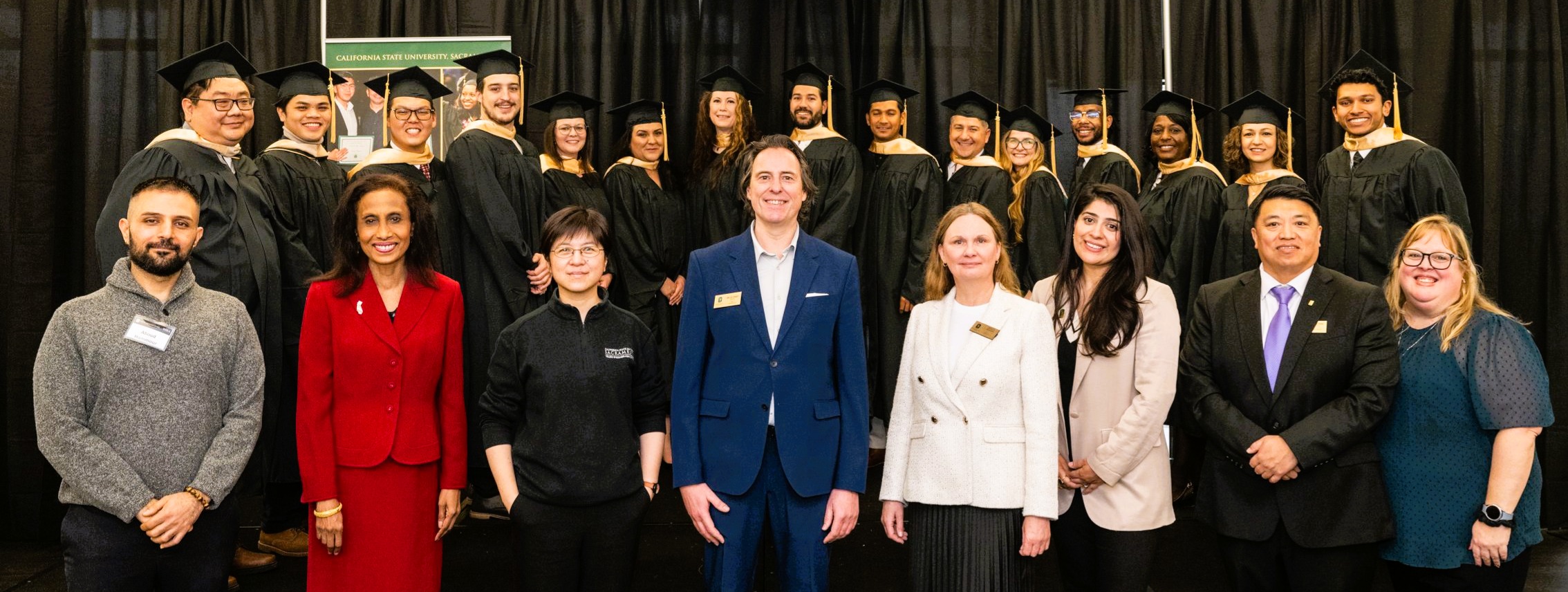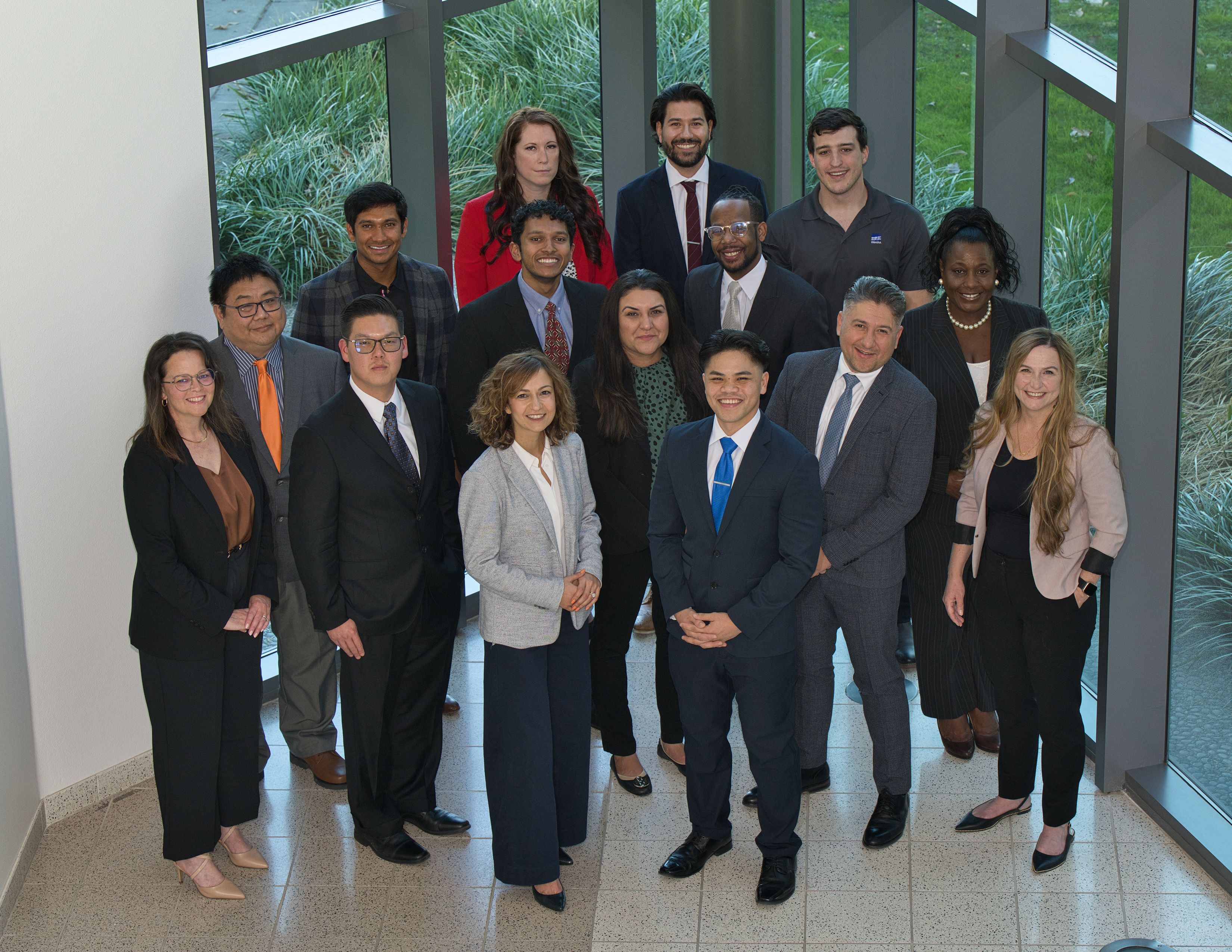Support Page Content
MBA for Executives
The College of Business has decided to place the EMBA program on hiatus until further notice. As a result, we will not be offering the program in Fall 2024 or Spring 2025. We encourage you to explore our fully online iMBA program or our flexible in-person evening MBA program.
Congratulations to our latest EMBA graduating cohort, COB5!

Sacramento State EMBA
Cohort-Based Program with Experienced Professionals
Designed for experienced professionals and managers who aspire to leadership positions, Sacramento State’s Master’s of Business Administration for Executives is a 15-month, cohort-based, AACSB-accredited degree program. The EMBA was developed and delivered in close collaboration with local business leaders to address both individual and organizational development needs.
The EMBA program is a partnership program with the College of Continuing Education (CCE).
- Participants gain the business acumen and network necessary to advance to leadership positions, or to strike out on their own.
- Public, private, and nonprofit employers prepare talented candidates for executive responsibilities.
Class Profile & Admissions Criteria
Selecting strong candidates for admission to the EMBA program is critical to the impact of the program and the quality of other cohort members’ experience.
Because we believe that there is more to a candidate’s qualifications than just test scores and GPA, we have adopted a portfolio approach that takes into account four primary areas of evaluation when making admission decisions:
- Professional Experience (length, breadth, and depth of professional and managerial experience, and potential for career development).
- Academic Qualifications (a baccalaureate degree from an institution accredited by a regional accrediting association and previous graduate-level coursework if available).
- Additional Relevant Criteria (potential contribution to learning experience in the program, maturity and motivation, ability and willingness to commit the required time and energy to the program, community service and professional activities, and support of an applicant’s employing organization).
- Personal interview to ascertain candidate suitability.

Program Highlights
Accelerated Format
- 15-month program (12 months of courses, 3 months individual projects)
Flexible Scheduling
- Classes are each 4 weeks in length and held on Fridays (3-7pm) and Saturdays (8am-2pm)
- Blended delivery (classes, lectures and distance learning)
- Every 3rd week courses offered online (weeks 1, 2 & 4 in-person)
Cohort-based Learning
- Stimulating networking environment
- Group work
Outstanding faculty
- Scholar with industry experience
- Executive co-instructors & guest speakers
Quality Accredited Program
- AACSB accredited program
- Assurance of student learning
Career Services
- Personalized services available to graduate business students and alumni
Minimum Qualifications
Candidates are required to have:
- Undergraduate degree from an accredited institution with a 2.50 overall GPA. Title V of the California Educational Code requires that MBA candidates must have earned a minimum 2.50 cumulative GPA and an undergraduate degree from an accredited institution. Foreign undergraduate degrees must be evaluated as equivalent to a 4-year, U.S. bachelor's degree with a minimum 2.50 cumulative GPA on a U.S. 4.0 scale.
- Applicants with foreign documents must submit their transcripts for evaluation by one of the approved agencies. Please review the information from the Office of Graduate Studies.
- 5+ years of professional work experience
- Applicants who earned a degree from an institution located in a nation where English is not the official language, or where the language of instruction at that institution was not English, must take the TOEFL or IELTS or PTE and receive a passing score: a minimum TOEFL of 550 (paper-based) or 80 (Internet-based), or an IELTS score of 6.5. Please review the information from the Office of Graduate Studies.
- Two Letters of recommendation
- Statement of Career Objectives (1 page): This statement should include a description of your long- and short-term career goals, and the ways in which you believe the EMBA degree will help you to achieve them.
- Current resume
- Personal interview with our Faculty Director (30 minutes, virtual)
The COB reserves the right to admit fewer applicants than those meeting the minimum criteria. In limited cases, applicants who do not meet all the minimum admission criteria may be reviewed by the Admission Committee for the program, who may offer a ‘special admission’ recommendation to the Dean, or the Dean’s designee, for a final admission decision.
Applicants with Foreign Documents
Applicants with foreign documents must submit their transcripts for evaluation by one of the approved agencies. Please review the information from the Office of Graduate Studies.
Applicants who earned a degree from an institution located in a nation where English is not the official language, or where the language of instruction at that institution was not English, must take the TOEFL or IELTS or PTE and receive a passing score: a minimum TOEFL of 550 (paper-based) or 80 (Internet-based), or an IELTS score of 6.5

EMBA Program Cost
As part of the California State University system, Sacramento State offers the lowest available tuition and fees for an AACSB-accredited Executive MBA program in the Sacramento region. The total cost for the program is $41,425 or $1,000 per unit which includes books, course materials, meals (Friday dinner, Saturday breakfast and lunch), international study tour (destination will be determined for your cohort), life-long access to the College of Business and EMBA alumni network association (OEMBA) social networking and professional/developmental events, and life-long access to career advising service.
The program will be billed in installments per class and a fee schedule will be provided for you based on the admission term. Please see the Program Calendar and Class Schedule under Current EMBA Student Information for the payment schedule and registration deadlines.
Financial Aid
At this time, no merit scholarships are available to EMBA students. The EMBA program does not provide graduate assistantships.
Financial Aid is processed through the College of Continuing Education (CCE) and may be available for students pursuing the EMBA degree. We recommend starting the financial aid process as early as possible by completing the Free Application for Federal Student Aid (FAFSA). More information can be found through CCE's website here. For questions, please contact: ccefinancialaid@csus.edu
A full list of scholarships available at Sac State can be found here. The Office of Graduate Studies may also provide additional opportunities to pursue and can be found here..
CSU Employees: The EMBA is considered self-support (i.e. Extended Education) and is not
eligible for the CSU Employee Fee Waiver and Reduction Program.
EMBA Academic Curriculum
Course descriptons can be found in the current Academic Catalogue.
After the two-day orientation event to introduce faculty, staff, and cohort members, students will participate in two days of “boot camp” refresher classes (Statistics, Economics, Finance, and Accounting) which help participants prepare for the academic rigor of the EMBA curriculum.
Note: EMBA 227 is the Graduate Writing Intensive (GWI) course that fulfills the first step of your Graduate Writing Assessment Requirement (GWAR). To complete the first step of the Graduate GWAR, all graduate students must earn a grade of B or higher in the required GWI course. More information can be found here.
| Course # | Course Name |
|---|---|
| EMBA Curriculum (41 units) | |
| Orientation (1 unit) | |
| EMBA 210 | Orientation and Bootcamp |
| Bootcamp | Statistics |
| Bootcamp | Economics |
| Bootcamp | Finance |
| Bootcamp | Accounting |
| Required Courses (24 Units) | |
| EMBA 222 | Managerial Accounting for Executives |
| EMBA 223 | Quantitative Methods for Decision Making |
| EMBA 224 | Managerial Finance for Executives |
| EMBA 225 | Organizational Design and Management |
| EMBA 226 | Technology Management for Executives |
| EMBA 227 | Strategic Marketing Management |
| EMBA 228 | Strategic Analysis for Executives |
| EMBA 229 | Leadership and Change Management |
| Elective Courses (12 units) Each cohort selects four of the following: | |
| EMBA 241 | Strategic Supply Chain Management |
| EMBA 242 | Product and Brand Management |
| EMBA 243 | Legal Issues in Business Environment |
| EMBA 244 | Corporate Performance Measurements |
| EMBA 245 | Competing in the Global Marketplace |
| EMBA 246 | Managing Creativity and Innovation |
| EMBA 247 | Executive Decision Making |
| EMBA 248 | Project Management for Executives |
| EMBA 249 | Management in the Public Sector |
| EMBA 296 | Experimental Offerings in Executive Management |
| EMBA 299 | Special Problems in Executive Management |
| Culminating Experience (4 units) | |
| EMBA 260 | EMBA Individual Project |
Dual Degree Programs
The Executive MBA program has partnerships with the College of Pharmacy at California Northstate University (CNUCOP) and the McGeorge School of Law at University of Pacific to accept nine (9) semester units of courses as elective units toward the graduation requirements of the EMBA Program.
Students must apply and be admitted separately into each program, satisfying the admission requirements of each institution. Students who are admitted into both programs can enroll and complete both programs in any order that they wish as long as they have at least one semester of concurrent enrollment in both institutions. Students must seek advance approval from the respective program administrator in order to request that the institution accept graduate courses to be transferred.
EMBA Application Instructions
NOTE: You must complete the entire application process and pay the $70 fee by the appropriate deadline to be considered an applicant to the program. Incomplete applications will not be reviewed.
Please follow the directions carefully below to be considered for the EMBA program. Applicants will need to submit the following:
Complete a Cal State Apply Application and pay $70 application fee
Download the MBA Instructions for the Cal State Apply Application as an example
- Add Program: Business Administration - Executive (EMBA) is located under Sacramento Extension
- Complete the Personal Information, Academic History, and Supporting Information Sections
- Under Program Materials, applicants will submit the following:
- Statement of Career Objectives (1 page): This statement should include a description of your long- and short-term career goals, and the ways in which you believe the EMBA degree will help you to achieve them.
- Current resume
- Request for two (2) letters of recommendation: Applicants will enter name and an email request will automatically be sent to the recommender on your behalf. Please advise your recommender to look for this email in their inbox, as well as their spam or junk-mail folder, as emails do occasionally get filtered out. Recommenders can complete the EMBA Recommendation Form or write their own letter and upload directly through the email portal. Please see page 27 of these instructions for more details on the recommendation submission process.
If eligible, applicants will be contacted for a personal 30-minute virtual interview with our Interim Faculty Director. The interview will be used to further assess the strength of their application and to make a final admission decision.
Applications for Fall 2024 are due May 16, 2024. We encourage early applications as applicants are admitted on a first-come, first-served basis.
Copies of official transcripts from all colleges and universities attended, other than Sacramento State sent electronically to gradtranscripts@csus.edu or hard copies to:
Office of Graduate Studies
California State University, Sacramento
Riverfront Center, Room 215, MS 6112
6000 J St.
Sacramento, CA 95819
Current EMBA Student Information
Spring 2024 (COB6) EMBA Program Calendar and Course Schedule

Contact Information
Prospective Students & Admissions
Pheng Yang
Graduate Programs Analyst
cobgraduateadmissions@csus.edu
(916) 278-5767
Current Students & Academic Advising
Serena Hoffman
Academic Advisor
cbagrad@csus.edu
(916) 278-6391
Graduate Programs Office
Current Students: cbagrad@csus.edu
Prospective Students: cobgraduateadmissions@csus.edu
Executive Director of Graduate Programs
Maleeha Khan
maleeha.khan@csus.edu
Mailing Address
California State University, Sacramento
College of Business - EMBA
Tahoe Hall, Room 1020
6000 J Street
Sacramento, CA 95819-6088
MBA Degree Learning Goals
Students will have certain capabilities (knowledge, skills, abilities) that result from your business degree program. At the Sacramento State, we call these capabilities learning outcomes. Learning outcomes are measured and analyzed through a broad range of assessments, from class assignments to standardized exams, to provide assurance of learning in the degree program. From time to time, the College of Business (COB) or your instructors may ask or require you to participate in assessments. We use the information from assessments to reinforce what is working or to make changes to support student learning and success. For example, we may revise curriculum or hire additional staff and faculty to support the needs of our students. We document how our students perform and the actions that we take to continuously improve. This process helps to enhance the student experience and maintain our external accreditation with AACSB International. Speaking of accreditation, less than 5% of business schools worldwide are accredited by AACSB and thus this elite accreditation contributes greatly to the COB reputation. We hope that when you are asked to participate in assessment activities that you will accept the invitation and put your best effort forward.
Goal 1: Applied Business Knowledge: Master, integrate, and apply business knowledge and skills to current, practical, and important contexts and situations.
1.1 Apply concepts, skills, and tools to impact practical, real-world business situations.
Goal 2: Leadership and Strategy: Effectively accomplish organizational goals in collaborative dynamic environments.
2.1. Formulate strategies and engage organizations to improve organizational effectiveness for long-term sustainability and competitive advantage.
Goal 3: Effective Business Communication: Effectively communicate in a variety of business settings using appropriate techniques.
3.1. Communicate in an organizational setting using appropriate oral and written formats for various purposes.
Goal 4: Integrative Analysis and Problem Solving: Address business situations in novel ways through reason and holistic analytical thinking.
4.1. Address business situations from multiple business functional areas to perform quantitative and qualitative analyses for effective decision making and innovative problem solving.
Goal 5: Global Business Context: Identify the significance of ethics, legal regulation, economics, social responsibility, cultural diversity, and global issues for planning and decision making.
5.1. Evaluate and adapt organizational and individual responses to diverse regulatory systems and ethical environments.
5.2. Assess and change organizational responses to international economic systems and intercultural environments.
